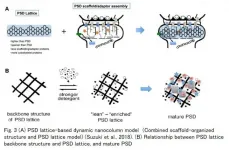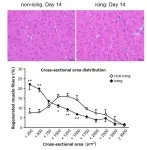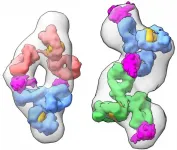Aggressive or friendly? The inflammatory protein interleukin 1β may decide
Researchers from the University of Tsukuba find that higher levels of interleukin 1β, an inflammatory protein, in an aggression-related brain region leads to fewer aggressive behaviors in mice, likely via its effects on serotonin neurons
2021-05-18
(Press-News.org) Tsukuba, Japan - Aggression is common in many neuropsychiatric diseases, such as dementia, autism spectrum disorder, and schizophrenia. It causes many problems for patients and their families, but can be difficult to treat because little is known about what causes it. In a study published last month in Molecular Psychiatry, researchers from the University of Tsukuba revealed that variation in levels of interleukin 1β (IL-1β), a protein that mediates the inflammatory response, is associated with individual differences in aggressive behaviors in male mice.
In humans, levels of inflammatory proteins such as IL-1β in the blood correlate with aggressive traits. To better understand these findings, researchers at the University of Tsukuba decided to investigate IL-1β levels in the blood of male mice, which they classified as aggressive or non-aggressive based on their behaviors toward other male mice. Unexpectedly, there were no differences in blood IL-1β levels between the aggressive and non-aggressive mice, in contrast to what had been reported in humans. This finding intrigued the researchers, and they wanted to know more.
"The dorsal raphe nucleus is a region of the brain that is important in aggressive behaviors," says lead author of the study Professor Aki Takahashi. "We decided to investigate IL-1β levels in this brain region in mice, and to experiment using drugs and genetic methods to reduce the effects of IL-1β on its receptors, to see if there were any related changes in aggressive behaviors."
The results were surprising: IL-1β was actually lower in the dorsal raphe nucleus of aggressive mice than in non-aggressive mice. In addition, in the experiments where IL-1β was less able to act on its receptors in this brain region, the mice were more aggressive.
The researchers then decided to look at the relationship between IL-1β and serotonin, a key neurotransmitter in the control of aggression. They found that, during aggressive encounters, serotonin neurons in the dorsal raphe nucleus were more active in aggressive mice than in non-aggressive mice. Moreover, when they experimentally lowered the expression of IL-1 receptors, serotonin neurons were also more active in this brain region.
"Our findings suggest that IL-1β in the dorsal raphe nucleus suppresses aggressive behavior, possibly by acting on the serotonin system," says Takahashi.
The findings suggest that IL-1β and serotonin neurons might be potential drug targets for reducing aggression, which currently has few effective treatments. The results of this study could therefore lay the foundations for research into treatment approaches for aggression in patients with neuropsychiatric diseases.
INFORMATION:
The article, "Neuromodulatory effect of interleukin 1β in the dorsal raphe nucleus on individual differences in aggression," was published in Molecular Psychiatry at DOI: 10.1038/s41380-021-01110-4
ELSE PRESS RELEASES FROM THIS DATE:
2021-05-18
[Outline]
A research group led by Specially appointed professor, Dr. Tatsuo Suzuki of Shinshu University School of Medicine developed a new purification protocol for Postsynaptic density (PSD) lattice, a core structure of the PSD of excitatory synapses in the central nervous system. The components of the PSD lattice were identified by comprehensive shotgun mass spectrometry and categorized as either minimum essential component (MEC) or non-MEC proteins. Tubulin was found to be a major component of the MEC, with non-microtubule tubulin widely distributed on the purified PSD lattice. The presence of tubulin in and around PSDs was verified by post-embedding immuno-gold labeling ...
2021-05-18
Postpartum psychosis is a devastating, but rare, mental health problem that affects women in the first few weeks after giving birth. Symptoms vary widely, and can include high mood (mania), depression, confusion, hallucinations and delusions.
Although the disorder affects only one in every 1,000 women who have a baby, it is much more common in mothers with a history of bipolar disorder or schizoaffective disorder (a condition which has symptoms of schizophrenia and bipolar disorder), or women who have suffered a previous episode of postpartum psychosis.
There are currently no biological markers that help to identify women who ...
2021-05-18
A study using a mouse model of eccentric contraction (*1) has revealed that icing injured muscles delays muscle regeneration. The discovery was made by a research group including Associate Professor ARAKAWA Takamitsu and then PhD. Student KAWASHIMA Masato from Kobe University's Graduate School of Health Sciences, and Chiba Institute of Technology's Associate Professor KAWANISHI Noriaki et al. In addition, the researchers illuminated that this phenomenon may be related to pro-inflammatory macrophages' (*2, 3, 4) ability to infiltrate damaged cells. This research raises questions as to whether or not severe muscle injuries (such as torn muscles) should be ...
2021-05-18
Robust data and genetic research are providing important evidence on a colony of wild African vervet monkeys that landed in Dania Beach more than 70 years ago and settled in a thick mangrove forest near the Fort Lauderdale-Hollywood International Airport in South Florida.
The non-native vervet monkey (Chlorocebus sabaeus) population living in this urban coastal region is well known and beloved among local residents and city officials; however, it is relatively unknown to primatologists. Despite wide public interest, there has been only one scientific study (early 1990s), suggesting that the monkeys escaped from a failed roadside zoo in the 1950s and 1970s. Until now, there was no confirmation about ...
2021-05-18
Scientists from Hokkaido University have developed a rapid, efficient protocol for cross-coupling reactions, vastly expanding the pool of chemicals that can be used for the synthesis of useful organic compounds.
Chemical reactions are a vital process in the synthesis of products for a diversity of purposes. For the most part, these reactions are carried out in the liquid phase, by dissolving the reactants in a solvent. However, there are a significant number of chemicals that are partially or completely insoluble, and thus have not been used for synthesis. The starting materials required for the synthesis of many cutting-edge organic materials--such as organic semiconductors and luminescent materials--are often poorly soluble, leading to problems in solution-based synthesis. Therefore, ...
2021-05-18
Vaccines are turning the tide of the pandemic, but the risk of infection is still present in some situations. If you want to visit a friend, get on a plane, or go see a movie, there is no highly accurate, instant test that can tell you right then and there whether or not you have a SARS-CoV-2 infection. But new research from Lawrence Berkeley National Laboratory (Berkeley Lab) could help get reliable instant tests on the market.
A study led by Michal Hammel and Curtis D. Hodge suggests that a highly sensitive lateral flow assay - the same type of device used in home pregnancy tests - could be developed using pairs of rigid antibodies that bind to the SARS-CoV-2 nucleocapsid protein. Such a test would only require a small drop of mucus or saliva, could give results ...
2021-05-18
The first-ever discovery of an extraterrestrial radioactive isotope on Earth has scientists rethinking the origins of the elements on our planet.
The tiny traces of plutonium-244 were found in ocean crust alongside radioactive iron-60. The two isotopes are evidence of violent cosmic events in the vicinity of Earth millions of years ago.
Star explosions, or supernovae create many of the heavy elements in the periodic table, including those vital for human life, such as iron, potassium and iodine.
To form even heavier elements, such as gold, uranium and plutonium it was thought that a more violent event may be needed, such as two neutron stars merging.
However, a study led by Professor Anton Wallner from The Australian National University (ANU) suggests ...
2021-05-18
A rigorous meta-analysis of randomized clinical trials (RCTs) that compared the effects of medical therapies alone with medical therapies plus revascularization in patients with stable ischemic heart disease (SIHD) was presented at EuroPCR on May 18, 2021. The study concluded that adding revascularization was associated with a statistically important reduction in cardiovascular death associated with a statistically important reduction in spontaneous myocardial infarction (MI), providing a biologically plausible explanation for the observed benefit.
An international group of investigators performed a meta-analysis of RCTs conducted between 1979 and 2020. Strict entry criteria were established to assure the analysis was restricted to studies involving elective, ...
2021-05-18
When it comes sharing recipes on social media, what users post, and what they cook may be two entirely different things. That's the conclusion of a END ...
2021-05-18
An international team of scientists from the Menzies Health Institute Queensland (MHIQ) at Griffith University and from City of Hope, a research and treatment center for cancer, diabetes and other life-threatening diseases in the U.S., have developed an experimental direct-acting antiviral therapy to treat COVID-19.
Traditional antivirals reduce symptoms and help people recover earlier. Examples include Tamiflu®, zanamivir and remdesivir.
This next-generation antiviral approach used gene-silencing RNA technology called siRNA (small-interfering RNA) to attack the virus' genome directly, which stops ...
LAST 30 PRESS RELEASES:
[Press-News.org] Aggressive or friendly? The inflammatory protein interleukin 1β may decide
Researchers from the University of Tsukuba find that higher levels of interleukin 1β, an inflammatory protein, in an aggression-related brain region leads to fewer aggressive behaviors in mice, likely via its effects on serotonin neurons



